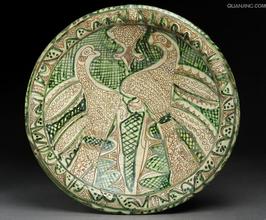From paired heads, we move to single heads of women
现在我们从夫妻头像转到单独的女性头像上来
starting with this dish marked with the workshop
首先从这个印有大概可追溯到1519年的
of Mastro Giorgio Andreoli Gubbio of
乔治·安德烈奥利·古比奥大师的
circa 1519
作坊的盘子看起
This bowl is the earliest in a group of pieces in the exhibition
这只碗是本次展览最早展出的一批
which are traditionally known as Bella Donna
传统上被称为美丽的女士
The group comprises a category of
这一批包括一种
maiolica dishes bearing female heads
印有女性头像
accompanied by a name label and an adjective
和由形容词 如:美丽的
such as "bella", beautiful
加名字组成标签的马爵利卡陶餐盘

These pieces were made in a number of different centres
这些瓷器出产于许多不同的制陶中心
and have been classed since the 18th century as love gifts
并从18世纪开始进行了归类
given by a man to his betrothed
作为男性赠给与之有婚约的女性的定情之物
they continue to intrigue scholars
它们仍吸引着学者
You can read the latest contribution by Luke Syson
你们可以阅读由鲁克·希森
to this long debate
最近为本展览画册中的
in the catalogue to the show
冗长的辩论所写的文字
which concludes that the women depicted
其中总结了所描绘的女性
and the ceramic pieces themselves
以及瓷器本身
are unequivocally objects of love
是明确的爱情信物
The heads are usually
这些头像通常被刻画成
stereotyped and stylized
比较刻板而程式化的形象
so as to make it hazardous to view them as portraits
从而避免使其与肖像画混为一谈
but the names are thought to refer to real women
但它们的名字被认为是真实的女性的名字
to whom the pieces were given as flattering tributes
这些瓷器是作为讨好她们的礼物
Support for this interpretation
支持这种说法的解释
comes from a poem
来源于安德里亚纳·肯盖尔
written by Adriana da Conquelle in 1557
于1557年
addressed to a potter of Deruta
写给德鲁特的一位制陶工人的诗
which takes the form of praise for
这首诗采用的是通过赞美他的故乡图尔迪
the women of his native city, Turdi
来恭维女性的形式而写的
The poem makes explicit
该诗歌非常明确地表明了
the link between living women
马爵利卡陶瓷上面所描绘的是
and female heads on maiolica
当时仍在世的女性头像
The names you find on these pieces
你们在这些瓷器上面看到的名字
often appear classical or literary
经常出现在经典名著或文学作品中
but we need to remember that such names were fashionable
但我们需要记住这些名字在15世纪末期
in the late 15th and early 16th centuries
和16世纪早期的
at a certain level of society
某个社会阶层是非常时髦的
The name "Beautiful Polyxena"
这只碗中描绘的
above the profile of a young woman
一位年轻女子的侧面图的上方所记载的
on this bowl is an Italian version of Polyxena, the daughter of
美丽的波利希娜是意大利版的波利希娜
King Priam of Troy
她是特洛伊的国王普利安的女儿
who was sacrificed to appease the ghost
她牺牲了自己
of Achilles in the stories
以此来使阿基里斯的灵魂得到安息
told in Ovid's metamorphosis
这是奥维德的变形记中所讲述的故事
With these classical associations, the name suggests
通过与这些古典名著的联系 这个名字揭示了
a certain level of literary
某个社会统治精英阶层内的文学
and classical culture within a social elite
和经典文化的某个层次












